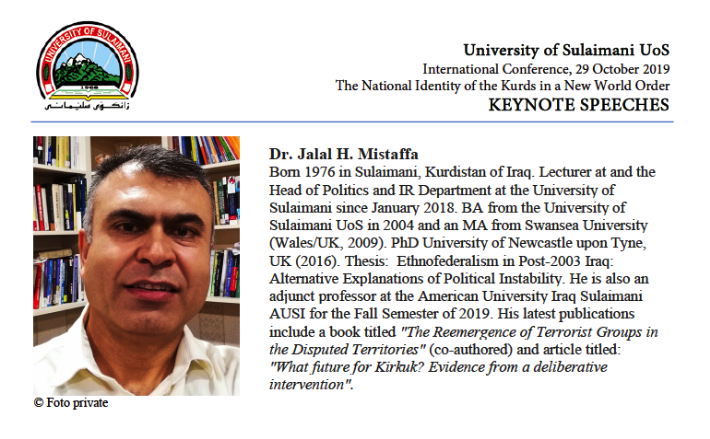Keynote Speech Jalal Mistaffa - fhe
Main menu
- H O M E P A G E
- THE ORIGIN OF THE KURDS 2011
-
CONCLUSIONS
- Prof. Windfuhr
- Prof. Klyosov
- Indigenous Kurds
- REACTIONS
- THE ORIGIN OF KURDS 2012
- DIE HERKUNFT DER KURDEN 2010
- DIE KURDEN 2004
- e-BOOK 2009
- CURRENT EVENTS 2011-2012
-
ARCHIVE
- Gas-Victims 1988
-
PICTURES
-
ANATOLIA
- VAN ANCIENT
- VAN-HAKKARI
-
KURDISTAN IRAQ
- BARZANI IRAN
- TALABANI
- FOLK COSTUMES
- Arbil
- GHN-45
- GAS-VICTIMS
- KORDESTAN IRAN
- ZAGROS
- PROFILES
- JERUSALEM
-
ANATOLIA
- THE FUTURE OF THE KURDS 2021
- KURD NATIONAL IDENTITY 2019
- PRIVATE PHOTOS
- CV English
- Lebenslauf
- COPYRIGHT & IMPRESSUM
Keynote Speech Jalal Mistaffa

The Decline of Kurdish Nationalism in Iraqi Kurdistan
Jalal Hasan Mistaffa
A quick survey and comparison between the nationalist feelings of the Kurdish people living
in the Kurdistan Region of Iraq before and after the uprising of 1991 would clearly indicate a
sharp decline. The decline can be described as the decline of the primordial senses of
nationalism to the benefit of instrumentalism. This decline may not be a real decay in
perceiving the Kurdish ethnicity as timeless and unchangeable, as still a large proportion of
common people believe so, as much as it is about what follows from that (the issues of
statehood, the leadership of ethnic political parties, and granting less role and importance to
nationalism). Such a decline may indicate how disappointed the Kurds have become in
political parties that represented the primordial trend of nationalism before and after the
uprising.
That is not to say that feelings of patriotism (in the sense of being serving the soil and loving
one’s country) is weakening as I perceive the two concepts patriotism and nationalism to be,
to some degree, independent.
The reasons and indications of the decline
Some reasons can be referred to be behind such a decline in the primordial nationalism
1. the actions of political parties who represented and tried to represent primordialism
2. a new generation born after the uprising that did not witness life under the Baath regime
3. the effects of globalization and social media
A few details about the mentioned reasons
* Political parties in Kurdistan region were the hope of the Kurds to be rescued from
Saddam’s regime and live an honorable and respectful life. The uprising of 1991 was a chance
for the people to see if their dream of being rules by their fellow ethnics would better off their
life and honor. Kurdish people’s hope weakened gradually when the political parties started a
civil war from that lasted from 1993 to 1998. Kurds in this region were so disappointed that a
large number of youngsters migrated to Europe.
* The young students I have been teaching for the few past years demonstrate a sort of
anti-
the nationalist political parties were seen to be really representing the interests of the
suppressed and oppressed Kurds. Therefore, they cannot be tamed by resorting the “mountain
struggle legacy”. For the after-
pride and legacy.
* Globalization, embodies for our case in social media outlets such as Facebook and
Instagram, has made the people all over the world, Kurds are not an exception, to establish
contact with non-
parties. Related to Kurdistan Region, this allowed for first hand and direct contact with non-
Kurds which in turn allowed for more room to ethnic toleration and rationalism in thinking
about ethnic relations.
* The issue of the KR referendum can be indicative of the weakening of the nationalist
feelings of the Kurds, yet there still exists a sort of anxiety and fear of breaking up with the
nationalism feelings among the older generations.
* As for the political parties, it can be argued that, they are in fact a combination of
primordial and instrumental feelings. The top leaders of these parties are well aware that
nationalism is an instrument of promoting one’s self (or selfish) interests. Capable of
concealing their instrumentalist thinking, the leaders are able to mobilize the commons
utilizing primordialism and diving deep into their national emotions. Yet, the members of
these nationalist political parties show more primordialism than non-
continuously under their political party’s political socialization procedures.